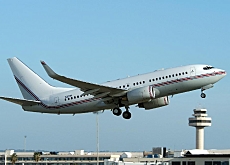Europe colluded with CIA on secret prisons

A Swiss investigator says more than a dozen European countries colluded in a "global spider's web" of secret CIA prisons and transfers of terrorism suspects.
Dick Marty, looking into the affair for the human rights watchdog, the Council of Europe, said seven nations played an active role and others, including Switzerland, turned a blind eye.
“It is now clear… that authorities in several European countries actively participated with the CIA in these unlawful activities. Other countries ignored them knowingly, or did not want to know,” Marty said, who did not spare Switzerland from his criticism.
In a 67-page explanatory memorandum to his report made public in Paris on Wednesday, the Swiss senator said there were corroborated facts strengthening the presumption that landing points in Romania and Poland were detainee drop-off points near to secret detention centres.
“Even if proof, in the classical meaning of the term, is not as yet available, a number of coherent and converging elements indicate that such secret detention centres did indeed exist in Europe.” He said these elements warranted further investigation.
Marty said he used evidence from national and international air traffic control authorities, as well as sources inside intelligence services, including in the United States, to compile a detailed picture of a global system of secret detentions and unlawful transfers.
He listed seven Council of Europe member states which could be held responsible, in varying degrees, for violations of the rights of specific individuals. They are: Sweden, Bosnia-Herzegovina, Britain, Italy, the former Yugoslav Republic of Macedonia, Germany and Turkey.
Swiss accusations
Several more colluded, actively or passively, in the detention or transfer of unknown persons, including Switzerland.
He accused the Swiss government of having “deliberately ignored allegations” of suspect aircraft transiting through the country’s airspace which were eventually confirmed by Swiss Federal Aviation Office.
He also said the government had recently “deliberately failed to execute an international arrest warrant brought by the Italian judicial authorities” following the CIA’s abduction of a suspect in Milan.
The man wanted by Italy, who Marty said was the head of the CIA operation in Milan at the time of the abduction, was staying in Geneva when the arrest warrant was issued.
He said the Swiss police had been “ordered to merely carry out discrete surveillance”, which the investigator concluded, “rekindles the criticism directed at the [Swiss] authorities, which are accused of slavish obedience towards the United States”.
He also questioned Switzerland’s decision in February to extend permission to the end of this year for overflights by non-commercial US aircraft.
The US request was granted after Switzerland won assurances from Washington that no prisoners had been transported through Swiss airspace. Marty doubted the “credibility” of the assurances “in light of the established facts”.
In response to the accusations, the Swiss government said it would take action if an internal investigation by the Federal Prosecutor’s Office uncovered evidence that the country’s airspace had indeed been violated.
Foreign ministry spokesman Jean-Philippe Jeannerat said Switzerland has always clearly stated its opposition to such extrajudicial actions contravening human rights and criminal law.
swissinfo with agencies
The Swiss Federal Civil Aviation Office confirmed that six suspected CIA flights landed in Switzerland.
In addition, 76 flights were made over Switzerland by US planes suspected of being used by the CIA between 2001 and January 2006.
The aviation office said these were registered as non-commercial flights.

In compliance with the JTI standards
More: SWI swissinfo.ch certified by the Journalism Trust Initiative











You can find an overview of ongoing debates with our journalists here . Please join us!
If you want to start a conversation about a topic raised in this article or want to report factual errors, email us at english@swissinfo.ch.